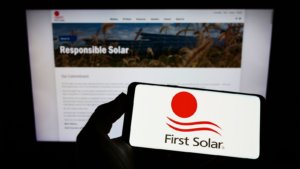The energy markets are facing unprecedented challenges and opportunities in the wake of the ongoing conflicts in the Middle East and Eastern Europe. The price of brent crude remains elevated, above $80/barrel, as the Israel-Hamas war and the Russo-Ukrainian war have led to oil market speculation on supply and demand. These geopolitical tensions are likely to persist for the foreseeable future, creating a favorable environment for energy companies that can capitalize on the rising oil prices.
Thus, investors who are looking for long-term growth and stability should consider adding these three energy stocks to their portfolio.
Frontline (FRO)

Frontline (NYSE:FRO) is one of the largest oil tanker companies in the world, with a fleet of 65 vessels that transport crude oil and refined products across the globe. The company benefits from the high demand for oil transportation, as well as the low operating costs of its modern and fuel-efficient ships. Moreover, as the Middle Eastern oil producers have largely cut production, oil tankers have found themselves increasingly traveling across to the Atlantic Ocean to ship crude from Brazil, the United States, and Guyana to countries in Asia. These longer distances have pushed up “ton-miles,” or the amount of crude shipped and the distance, and as a result, revenue.
Frontline has a solid balance sheet with more than $500 million in cash and liquid short-term investments. The company’s generous dividend, with a yield of 5.4%, could also be attractive for long-term holding income investors.
DHT Holdings (DHT)

DHT Holdings (NYSE:DHT) is another leading oil tanker company, with a fleet of 21 very large crude carriers (VLCCs) that can each carry up to 2 million barrels of oil. Similar to Frontline, DHT Holdings has a competitive advantage in the VLCC segment, as it operates some of the largest and most efficient ships in the industry. Also similar to Frontline, as more oil is being sourced from across the Atlantic, DHT is benefitting from higher ton-miles, which have driven strong financial results throughout 2023.
In both the first and second quarter, revenue increased on an annual basis in the strong double digits while net margins also increased significantly year-over-year. The company also rewards its investors with a relatively high dividend, with a yield of 4.3%. Trading at only 10.3x forward earnings, DHT appears to be a great bargain for potential long term holders.
First Solar (FSLR)

Solar energy stocks have had a tough time in 2023. A lot of this is due to energy prices being less elevated than they were in 2022, and as a result, solar appears less competitive than non-renewable energy sources. Moreover, higher interest rates have impacted the margins of many of these solar panel companies who tend to have large amounts of debt capital on their balance sheets. However, as energy prices remain volatile due to geopolitics and after solar stocks have hit record lows, it may be just the time to reconsider one of the space’s largest players: First Solar (NASDAQ:FSLR).
Last week, First Solar reported its Q3 earnings results, which saw the solar energy firm beating bottom-line estimates, but revenue came in short. The company also increased full-year earnings guidance, while keeping revenue guidance unchanged. A broader shift to renewable energy and, most recently, the Inflation Reduction Act of August 2022, which extended the federal investment tax credit (ITC) for solar projects to 26% through 2025, should help drive First Solar’s intrinsic growth rate in the coming years, so while the solar energy stock is trading at only 13.1x forward earnings, investors should think about allocating and holding for the long term.
On the date of publication, Tyrik Torres did not hold (either directly or indirectly) any positions in the securities mentioned in this article. The opinions expressed in this article are those of the writer, subject to the InvestorPlace.com Publishing Guidelines.
